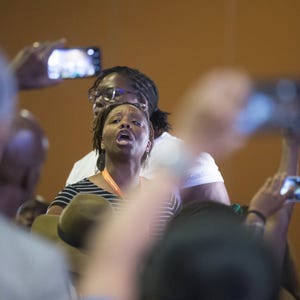Above Photo: From PopularResistance.org.
MINNEAPOLIS — Hundreds of protesters shut down northbound Interstate 94 through Minneapolis Monday night reacting to the shooting of a black manby Minneapolis police. In all, 51 people were arrested.
The Minnesota Bureau of Criminal Apprehension is investigating a disputed officer-involved shooting involving a young African-American man. VPC
The Minnesota Department of Transportation reports protesters were on the freeway, attempting to block traffic. The shutdown first started around 7 p.m.
Several area metro police departments were on scene attempting to control the situation. According to the Minnesota State Patrol, protesters were given four warnings to disperse or be subject to arrest.
Shortly before 9 p.m., authorities began arresting protesters. The state patrol later said 43 adults and eight juveniles were arrested and will be charged with unlawful assembly and pedestrian on freeway, both misdemeanors.
The state patrol says numerous cars were damaged in the protest. At least on trooper was punched by a protester, and that person fled the scene.
Family members said Jamar Clark, 24, was shot in a scuffle with officers early Sunday morning. Police say he was a suspect in a domestic assault and interfered with paramedics who responded to the scene. Some witnesses allege Clark was handcuffed when he was shot.
Clark’s father, James Hill, told The Associated Press that his son, said to be on life support, suffered a single gunshot wound over his left eye.

Minneapolis Mayor Betsy Hodges said Monday she wrote to the Civil Rights Division of the Department of Justice and to the U.S. attorney for Minnesota seeking a federal investigation in the “interest of transparency and community confidence.” The state’s Bureau of Criminal Apprehension is already conducting a criminal investigation, but Hodges said the city needs “all the tools we have available to us.”
94 at a stand still #Justice4Jamar #Minneapolis pic.twitter.com/E3B4XlaWPX
— Toki Wright (@mrwrighttc) November 17, 2015
According to court documents, Clark has past convictions that include an aggravated robbery in 2010 and one for terroristic threats from earlier this year. The shooting sparked protests Sunday and an overnight encampment at the north Minneapolis police precinct near the site of the incident. Protests continued Monday, with a few hundred people gathering at an evening rally outside the same precinct, beating a drum and chanting for justice. At least eight tents were set up outside, and a handful of protesters were sitting behind glass doors in the foyer, including one who was knitting. “We’re still not moving until we get that footage,” said Michael McDowell, a member of Black Lives Matter. “Every witness account I heard said he was handcuffed. Every witness account. Put a knee on him and shot in the head. That’s the account I’ve heard from young people, older people …,” said Jason Sole, criminal justice chair for the Minneapolis NAACP. Nekima Levy-Pounds, president of the Minneapolis chapter of the NAACP, called the civil rights request a step in the right direction, “given that we do not trust Minnesota law enforcement officials to hold themselves accountable.” The protests are just the latest expression of tension between the department and minorities in the city.
protestors sitting down refusing to be moved and take arrests of necessary #Justice4Jamar #JamarClark pic.twitter.com/x2599S1dMy — Lightskin Tyreese (@thekingjobe) November 17, 2015
Outrage and a civil lawsuit followed the 2013 death of 22-year-old Terrance Franklin, a burglary suspect whom police pursued and shot in a Minneapolis basement. A grand jury declined to indict the officers involved.
In 2014, prominent civil rights activist Al Flowers complained of being the victim of brutality when police served a warrant on a relative at his home. Police say Flowers instigated their aggression.
The rocky relations have led to discussions between police and minorities and the creation of task forces designed to quell concerns. This spring, Minneapolis was selected for a federal Justice Department program to rebuild trust between police and the communities they patrol.
KG Wilson, a peace activist who retired weeks ago after 11 years of building relationships between the community and the police department, said he’s hurt by the reaction he is seeing and disagrees with the protests.
“I hate that this is going on right now. My heart is so crushed. I have not stopped crying,” he said, adding that some protesters are looking for an excuse to be angry. “I think everything is being gone about in the wrong way. … Peace is always the way. You can’t bring peace with aggression.”

